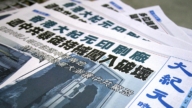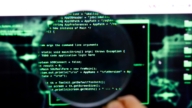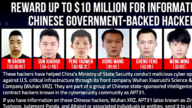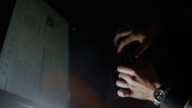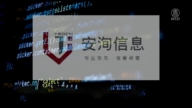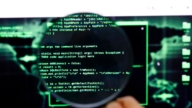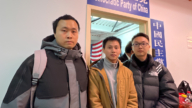【新唐人2013年08月31日讯】自中共当局以打击“网路传谣”的名义进行网路言论打压以来,先后有多名网路名人被警方以“寻衅滋事罪”拘捕,其中包括网路推手秦火火(本名秦志晖)、立二拆四(本名杨修宇)、广州记者刘虎以及湖南记者格祺伟等等。对此,法律界诸多律师提出,刘虎等人的行为完全不符合“寻衅滋事罪”的任何法定情形,当局以此为由随意拘留网路人士的做法已经超出了法律的规定。
广州《新快报》记者刘虎因“涉嫌寻衅滋事罪”被北京警方拘捕后,他的律师周泽和斯伟江8月29号在网路上向当局发出联名律师意见书。提出当局对刘虎的一系列指控,根本无法构成“寻衅滋事罪”。
此前,刘虎曾经在微博上实名举报中共国家工商总局副局长马正其,陕西公安厅长杜航伟等四位副部级高官和其他官员涉嫌贪污腐败。律师们认为,刘虎的网路实名举报是正常行使了一个公民监督权。
东南大学法学教授张赞宁:“因为刘虎他是个职业记者,他是履行自己的职责,而且他还有举报贪官的行为,这是国家允许的,是他的职责范围内的一些行为,以‘寻衅滋事罪’拘留他完全是没有道理的,这可能是中国的一大发明吧!”
法律界认为,刘虎所谓的“犯罪事实”都是言论,而“寻衅滋事罪”是针对行为制定的法律,言论和行为二者性质完全不同。而且《刑法》对“寻衅滋事罪”发生的场所的规定,也仅限存在于现实世界的公共场所而不是虚拟空间。
张赞宁:“寻衅滋事根据中国法律的解释就是指肆意挑衅、随意殴打扰乱他人,或者任意损毁、侵占公私财务,或者在公共场所起哄闹事,严重破坏社会秩序的行为。这四个情节他一个也没有,也不存在。”
刘虎的律师还表示,刘虎对贪官的网路实名揭发是有根据的。根据万州区相关国有企业员工的举报材料,刘虎经过调查后发现了马正其存在滥用职权的重大违法犯罪嫌疑,并对此事跟踪了八年时间。他在无法通过媒体公开报导的前提下,不得已通过网路进行实名举报的。
外界认为,公民在网路上的言论,即使所传的信息有些不准确或夸大,只要没有对社会或者个人造成实质性伤害,就不应该定为造谣、传谣的罪名。
北京社会活动家胡佳 :“网路是个言论空间,它里边所谓炒作并不违法,尤其在网路上批评政府,哪怕证实某些话语是谣言,不准确的,或者不存在的,不管是什么目的,但这个话语主要起到监督政府和政府官员的这样作用的话,都不能够成为政府的报复对像。”
网路上造谣、传谣的现象的确时有发生,一般多为涉及侵犯名誉权或诽谤罪,比如捏造事实对他人进行诽谤污蔑,给对方造成名誉伤害,按照司法解释,双方应该自行通过法律程式解决,官方是无权主动参与的。
张赞宁:“像秦火火造谣啊,从官方媒体公布他的罪名来看,什么诽谤雷锋啊、说雷锋是假的,雷锋本来就是假的嘛,早就受到社会上广大的质疑。而且谣言的话,起诉人不应当是官方,应当是受害人,如果你造谣侵害了某个个人的权益,比如侵害了雷锋的权益,那应当是雷锋的家属来起诉他,而不应当官方、警方来介入这个案件,我想这是没有依据的,也是违法的。”
法律界奉劝当局,不要因为要打击“网路谣言”而置法律于不顾,也不要用莫须有的罪名公然强加在网路异议人士的身上,这样只会让民众对当局封杀网路言论的行为更加反感,使政府的公信力丧失殆尽。
采访编辑/张天宇 后制/李智远
Chinese Communist Party Imposes Crimes On Netizens;
Legal Profession Supports Netzien Liu Hu
The Chinese Communist Party (CCP) recently
cracked down on internet speeches.
Since then, several well known netizens have been
arrested for “creating troubles".
They include network push hand Qin Huohuo (real name
Qin Zhihui), Lierchaisi (real name Yang Xiuyu),
Guangzhou journalist Liuhu,
Hunan journalist Ge Qiwei, and others.
Many lawyers say the netizens’ actions don’t match the crime,
and it’s beyond the law to detain them arbitrarily.
Beijing police arrested new Express Daily journalist Liu Hu,
suspecting him of committing “crimes of creating trouble".
His lawyers Zhou Ze and Si Weijiang published a joint letter
to the CCP over the internet on August 29.
They indicated the accusations to Liu Hu don’t constitute
a “crime of creating trouble".
Liu Hu once reported online about the corruption of
Business Administration deputy director Ma Zhengqi,
Shanxi Safety Bureau director Du Hangwei,
and two other high level officials.
The lawyers believe that Liu Hu’s action of reporting official
corruption are citizens’ rights to oversee the government.
Southeast University law professor Zhang Zanning:
“Since Liu Hu is a journalist, he was performing his duty.
His action of reporting corrupt officials
is allowed by the nation.
It’s not reasonable to detain him
on “crimes of creating trouble"
because his actions are within the scope of his duty."
The legal community believes that the so called
“facts of the crime" of Liu Hu are all speeches.
But “crime of creating trouble" is talking about actions.
Speech and action have different characteristics.
Criminal Law defines “crime of creating trouble" as actions
carried out in real public places instead of virtual space.
Zhang Zanning: “Chinese law defines the
“crime of creating trouble" as provocation,
beating or disturbing others,
destroying or taking public property,
creating disturbances in public places,
and seriously undermining public order.
Liu Hu didn’t do any of that."
Liu Hu’s lawyer also indicates that
Liu’s report has evidence to support this.
According to sources from a state owned company
in Wangzhou District,
Liu Hu found out that Ma Qizheng is believed
to commit serious abuse of power.
Liu investigated the case for 8 years.
Finding no way to publish his investigation through the
media, he could only report about it on the internet.
The outside world says civilian speech on the web
shouldn’t be considered a crime of making or spreading rumors,
if it doesn’t harm society or individuals,
even if the information isn’t precise or is exaggerated.
Beijing rights activist Hu Jia: “The web is a place for speeches.
Speculation online is not against the law.
Especially critiques to the government, even if
some are rumors, not precise or don’t exist.
If the speeches are effective in supervising the CCP and
officials, they shouldn’t become the CCP target of retaliation."
Creating and spreading rumors online happens often,
but it’s usually for reputation infringement or defamation,
such as fabricating facts to ruin one’s reputation.
According to judicature, the two sides should solve
the problem through legal procedure, and the CCP has no rights to interfere.
Zhang Zanning: “About Qin Huohuo making rumors,
CCP media published that he defamed Lei Feng,
saying Lei Feng is fake.
Lei Feng is fake, which is questioned by
the society long ago.
Also, if someone creates rumors, it shouldn’t be
the government who brings a lawsuit, but the victim.
If one harms another’s rights and benefit,
such as Lei Feng,
it should be Lei Feng’s family suing Qin
not the government or police.
I don’t think it’s justified, and it’s illegal."
The legal community advises the CCP not to crack
down on “internet rumors" and ignore the law.
Not to charge unfounded crimes on internet dissidents.
The action of blocking internet speeches can only
irritate people, and lose the government its credibility.


